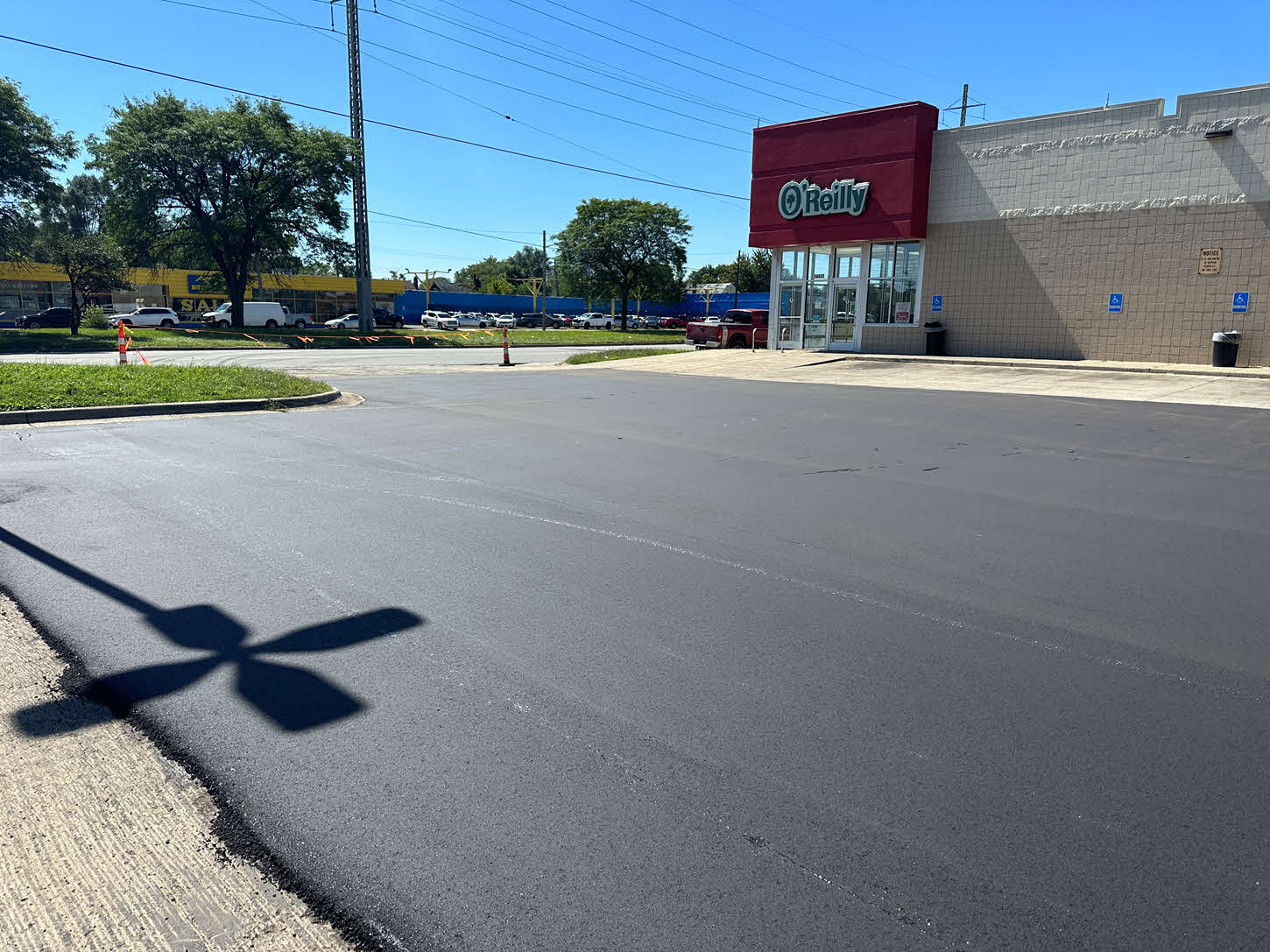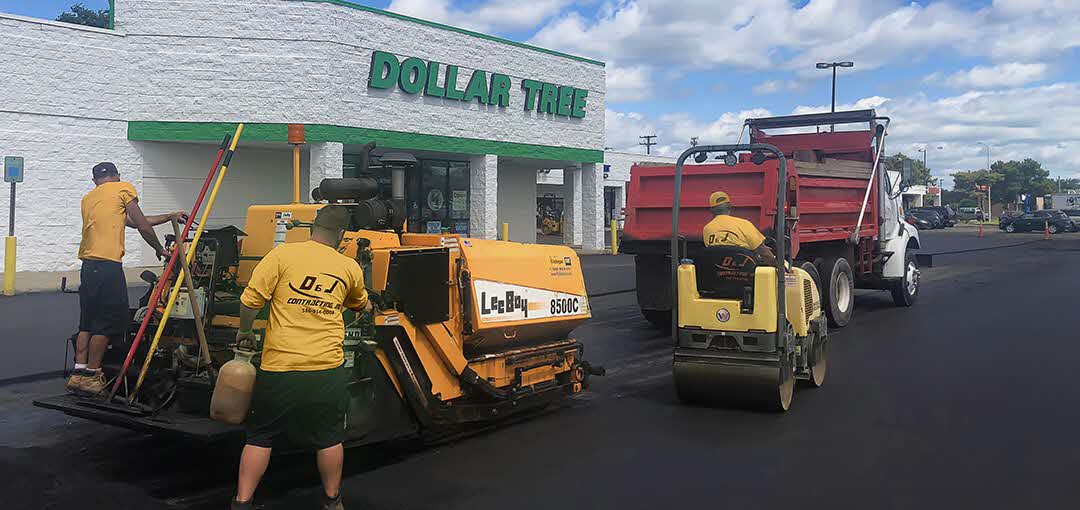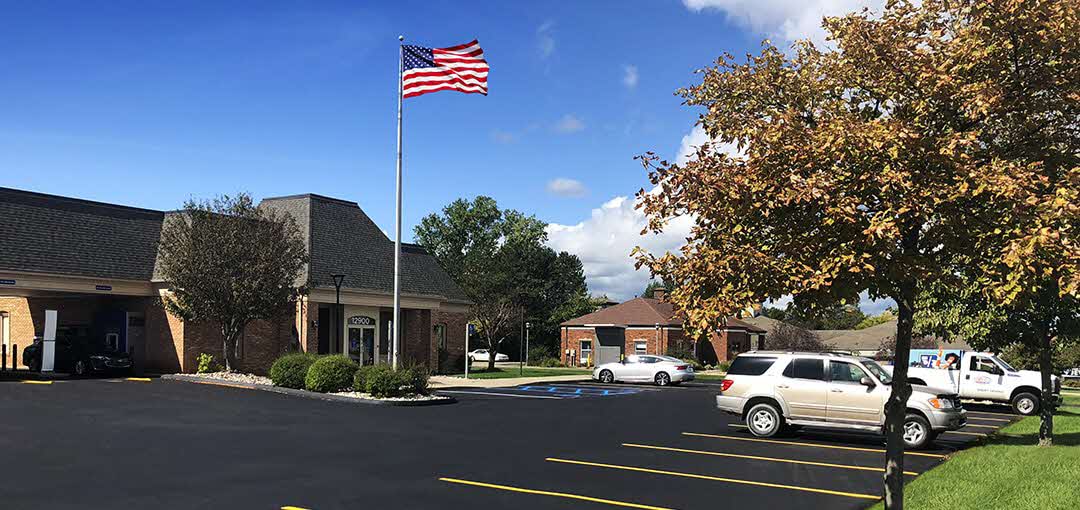Asphalt Patch inRoseville, MI
Seamless Asphalt Patching to Extend Pavement Life
We Are Locally Owned & Operated For Over 37 Years
Contact Us Today!
We Serve Businesses In And Around The Following Cities:
About Asphalt Patch
Comprehensive Guide to Asphalt Patch for Commercial Properties in Roseville
Understanding Asphalt Patch in Roseville
In the bustling commercial landscape of Roseville, maintaining the integrity and appearance of property exteriors is of utmost importance. This maintenance directly impacts not only a company’s aesthetic appeal but also its operational safety and asset longevity. Among the various exterior maintenance needs, asphalt patch emerges as a critical component, providing a cost-effective and efficient solution to pavement wear and tear. An asphalt patch is essentially a targeted form of asphalt repair that addresses smaller sections of damage, such as potholes, depressions, or cracks, restoring the affected area without necessitating full-scale repaving.
In the environment where commercial properties operate, the driveways, parking lots, and access roads are regularly subjected to substantial pressure from traffic, weather conditions, and even natural settlement over time. This inevitably leads to deterioration, posing hazards and affecting the business’s image. By investing in timely asphalt patch repair, businesses in Roseville can maintain smooth, safe surfaces that welcome employees, clients, and visitors alike. Furthermore, the application of asphalt patch solutions extends the overall life of asphalt surfaces, turning what could have been costly full replacements into manageable maintenance tasks.
The Process of Asphalt Patching
The process involved in asphalt patching is methodical, ensuring each application achieves durability and aesthetic coherence with existing surfaces. Initially, each site is assessed to determine the level of damage and the best approach required for repair. The area needing attention is thoroughly cleaned and prepared, with debris, dirt, or loose material being removed to ensure a clean working surface. This step is pivotal as it avoids potential faults in the new patch.
Once prepared, an application of tack coat may be applied to help the new asphalt adhere to the older layer. This is followed by the actual patching, where hot or cold mix asphalt—depending on the season and specific requirements—is applied to the prepared area. Hot mix is typically favored due to its durability and reliability in ensuring a strong bond. After application, the asphalt is compacted using specialized machinery, ensuring the repair is flush with existing surfaces and any previous depressions or bumps are smoothed out. This meticulous attention to detail during the asphalt patch repair process makes it a sustainable and effective solution for commercial properties seeking to maintain their infrastructure.
Benefits of Asphalt Patch for Commercial Properties
The adoption of asphalt patch solutions affords numerous benefits that align with the business and strategic goals of commercial properties. Primarily, it offers a significant reduction in repair costs; businesses can avoid the exorbitant expenses associated with complete resurfacing by opting for this targeted repair method. This allows property managers to allocate funds to other essential areas without compromising on safety or quality.
Improved safety is another crucial benefit. Asphalt patches eliminate risks associated with potholes and uneven surfaces—hazards that can lead to accidents, customer dissatisfaction, and potential liabilities. Moreover, a well-maintained asphalt surface enhances aesthetic appeal, creating a favorable first impression that can significantly influence customer perceptions and client relationships.
In terms of environmental impact, asphalt patching is considered a more sustainable option than total replacements. It uses fewer materials and generates less waste, aligning with eco-conscious business practices. Importantly, it also enables business continuity with minimal disruption, as patch jobs are quicker to complete compared to full-scale renovations. Companies such as D&J Contracting offer professional services that ensure minimal downtime, a key consideration for commercial entities striving to maintain uninterrupted operations.
Real-World Applications in Roseville
Throughout Roseville, the practical application of asphalt patching can be seen in various commercial settings, illustrating its adaptability and significance. Shopping centers, for instance, are high-traffic areas where parking lots experience consistent wear. Timely patching ensures smooth navigation for vehicles and pedestrians alike, maintaining a safe environment while preserving the center’s visual appeal.
Similarly, business parks and office complexes where employee and visitor vehicles regularly operate benefit from the timely application of asphalt patches. Such repairs prevent the progression of minor damages into more significant issues that could disrupt access and office operations. By opting for regular assessments and strategic patching, managers can prevent larger-scale deterioration and save on future reparative costs.
Furthermore, service and delivery zones where heavy vehicles frequently load or unload goods often face intense pressure that can accelerate asphalt wear. Asphalt patches provided by experts like D&J Contracting offer sturdy repair solutions that withstand substantial weight, ensuring these vital operation areas remain functional and safe.
Local businesses in Roseville that have integrated asphalt patching into their maintenance regimes have not only seen improvements in infrastructure quality but have also enjoyed enhanced customer trust and loyalty. This proactive approach to property upkeep signifies a commitment to operational excellence, impacting bottom-line performance by improving safety standards and reducing unexpected repair costs.
Engaging a Trusted Partner
Considering the complex interplay of factors that necessitate asphalt patching, enlisting a reliable contractor is a prudent decision for businesses in Roseville. While there are numerous options, engaging a partner like D&J Contracting comes with distinct advantages. With a proven track record of excellence in asphalt repair services, they offer precision, expertise, and timeliness that ensure projects are completed to highest standards, safeguarding the commercial property’s investment. Additionally, their expertise in both asphalt patch repair and broader paving solutions means businesses can enjoy comprehensive service without the need to coordinate multiple vendors.
By integrating professional support with an understanding of local conditions and business needs, such contractors help ensure maintenance strategies are both effective and sustainable. This allows business owners to focus on their core operations, confident that their property conditions are expertly managed.
In contemplating the future, businesses in Roseville aiming to maintain optimal exterior environments can leverage the insights and services discussed to navigate the challenges of property maintenance. Embracing asphalt patch as a versatile and strategic solution for pavement upkeep not only enhances business operations but also contributes to a vibrant community infrastructure, supporting Roseville’s progressive commercial landscape.
Asphalt Patch Gallery


Call Us Today to receive your Free Quote for
Asphalt Patch in Roseville
Serving: Roseville, Michigan

About Roseville, Michigan
The first permanent post office in the area was established in 1840 by William Rose who named it “Roseville” in honor of his father Dennison Rose, a veteran of the War of 1812.
The village of Roseville was incorporated in 1926, and the municipal building was constructed in 1929 at Gratiot Avenue and Meier Road. This replaced the Erin Township Building that was built near the corner of 11 Mile Road and Gratiot in 1886. The 1929 building housed administrative offices as well as the police and fire departments until the 1960s, when separate police and fire stations were constructed. City offices remained in the building until 1974.
Michigan’s first commercial airport, Packard Field, opened at Gratiot Avenue and Frazho Road in 1919. It was renamed Gratiot Airport in 1929, and later Hartung Field. The Eastgate Shopping Center was constructed on the site in the 1950s.
The Erin-Roseville Library was established in 1936 in one room of the municipal building. The library moved to its own building in the 1960s and into the newly constructed civic center in 1974. In 2010, it was circulating approximately 250,000 items annually.
In 1958, the village and remaining parts of Erin Township were incorporated as the City of Roseville.
An early regional mall, the Macomb Mall, opened in 1964 and is still open today, located west of Gratiot and Masonic.
Roseville is in southern Macomb County, 14 miles (23 km) northeast of downtown Detroit. It is bordered to the east by St. Clair Shores, to the south by Eastpointe, to the west by Warren, and to the north by Fraser and Clinton Township. Mount Clemens, the Macomb county seat, is 7 miles (11 km) to the northeast.
According to the United States Census Bureau, Roseville has a total area of 9.86 square miles (25.54 km), of which 9.84 square miles (25.49 km) are land and 0.03 square miles (0.08 km), or 0.27%, are water.
 I-94 runs north–south, though still signed east- and westbound, along the eastern edge of the city. Between 10 and 12 Mile Roads, it forms the boundary between Roseville and St. Clair Shores.
I-94 runs north–south, though still signed east- and westbound, along the eastern edge of the city. Between 10 and 12 Mile Roads, it forms the boundary between Roseville and St. Clair Shores. I-696 (Walter P. Reuther Freeway) travels east and west through the middle of Roseville.
I-696 (Walter P. Reuther Freeway) travels east and west through the middle of Roseville. M-3 (Gratiot Avenue) (; named after engineer Charles Gratiot) runs northeast and southwest, and (roughly) bisects the city as it connects Detroit to Mount Clemens and points north.
M-3 (Gratiot Avenue) (; named after engineer Charles Gratiot) runs northeast and southwest, and (roughly) bisects the city as it connects Detroit to Mount Clemens and points north. M-97 (Groesbeck Highway), named for Governor Alex Groesbeck, is near the western edge of Roseville. It extends northeast from Detroit and is a high-speed and broad diagonal connector to northern Macomb County.
M-97 (Groesbeck Highway), named for Governor Alex Groesbeck, is near the western edge of Roseville. It extends northeast from Detroit and is a high-speed and broad diagonal connector to northern Macomb County.
- East–west travel is mainly on the mile roads; that is, 10 Mile Road on the south (Eastpointe, formerly known as East Detroit) border through 14 Mile Road on the north border.
- Utica Road is an important diagonal connector that crosses the city from southeast to northwest, starting at Martin Road, near Gratiot Avenue, and extending to the city’s northern boundary at 13 Mile, then to Fraser, Clinton Township, Sterling Heights and Utica beyond.
| Census | Pop. | Note | %± |
|---|---|---|---|
| 1930 | 6,836 | — | |
| 1940 | 9,023 | 32.0% | |
| 1950 | 15,816 | 75.3% | |
| 1960 | 50,195 | 217.4% | |
| 1970 | 60,529 | 20.6% | |
| 1980 | 54,311 | −10.3% | |
| 1990 | 51,412 | −5.3% | |
| 2000 | 48,129 | −6.4% | |
| 2010 | 47,299 | −1.7% | |
| 2020 | 47,710 | 0.9% | |
| U.S. Decennial Census | |||
As of the census of 2010, there were 47,299 people, 19,553 households, and 12,055 families living in the city. The population density was 4,811.7 inhabitants per square mile (1,857.8/km). There were 21,260 housing units at an average density of 2,162.8 per square mile (835.1/km). The racial makeup of the city was 83.1% White, 11.8% African American, 0.4% Native American, 1.6% Asian, 0.4% from other races, and 2.6% from two or more races; 2% of the population was Hispanic or Latino of any race.
There were 19,553 households, of which 30.9% had children under the age of 18 living with them, 38.3% were married couples living together, 17.4% had a female householder with no husband present, 6.0% had a male householder with no wife present, and 38.3% were non-families. 31.7% of all households were made up of individuals, and 11.6% had someone living alone who was 65 years of age or older. The average household size was 2.41 and the average family size was 3.03.
The median age in the city was 37.9 years. 23% of residents were under the age of 18; 8.9% were between the ages of 18 and 24; 28.3% were from 25 to 44; 26.7% were from 45 to 64; and 13.1% were 65 years of age or older. The gender makeup of the city was 48.4% male and 51.6% female.
As of the census of 2000, there were 48,129 people, 19,976 households, and 12,724 families living in the city. The population density was 4,905.6 inhabitants per square mile (1,894.1/km). There were 20,519 housing units at an average density of 2,091.4 per square mile (807.5/km). The racial makeup of the city was 93.43% White, 2.60% African American, 0.42% Native American, 1.63% Asian, 0.03% Pacific Islander, 0.32% from other races, and 1.57% from two or more races; 1.5% of the population was Hispanic or Latino of any race.
Of the 19,976 households, 28.6% had children under the age of 18 living with them, 46.4% were married couples living together, 12.7% had a female householder with no husband present, and 36.3% were non-families. 30.8% of all households were made up of individuals, and 12.6% had someone living alone who was 65 years of age or older. The average household size was 2.40 and the average family size was 3.02.
In the city, the population was varied widely, with 23.1% under the age of 18, 8.2% from 18 to 24, 33.0% from 25 to 44, 20.2% from 45 to 64, and 15.4% who were 65 years of age or older. The median age was 36 years. For every 100 females, there were 93.8 males. For every 100 females age 18 and over, there were 90.1 males.
The median income for a household in the city was $41,220, and the median income for a family was $49,244. Males had a median income of $40,113 versus $26,281 for females. The per capita income for the city was $19,823. About 6.1% of families and 7.9% of the population were below the poverty line, including 9.9% of those under age 18 and 5.8% of those age 65 or over.
Roseville has a council-manager government. Voters elect the six council members, mayor, city clerk and treasurer for four-year terms. The terms are staggered so that only three council members are selected in odd-year general elections.
Roseville is located within the 39th Judicial District with the city of Fraser.
Public schools are operated by Roseville Community Schools and Fraser Public Schools. Roseville Community Schools operates seven elementary schools, two middle schools and one high school. Fraser Public Schools operates two elementary schools in the city.
The charter school Conner Creek Academy East is in the city.
St. Angela School of the Roman Catholic Archdiocese of Detroit operated from approximately 1954 until the 2010s.
Call Us Today to receive your Free Quote for
Asphalt Patch in Roseville
Related Services in Roseville, Michigan
We Serve Businesses In The Following Zip Codes:
48007, 48015, 48021, 48026, 48035, 48036, 48038, 48042, 48043, 48044, 48045, 48046, 48047, 48048, 48050, 48051, 48066, 48071, 48080, 48081, 48082, 48083, 48084, 48085, 48088, 48089, 48090, 48091, 48092, 48093, 48098, 48099, 48225, 48230, 48236, 48310, 48311, 48312, 48313, 48314, 48315, 48316, 48317, 48318, 48397